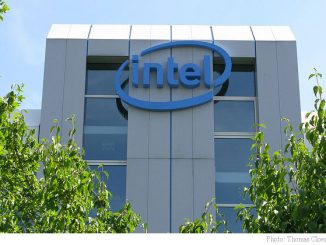- Intel‘s (INTC) shares rose 8% to an intraday high of $21.88 after U.S. VP JD Vance‘s speech at the Paris AI summit, where he vowed to protect American AI technologies from misuse by adversaries.
- Intel has been struggling, losing more than 50% of its stock value y/y while competitors like Nvidia (NVDA) and Broadcom (AVGO) thrived, with Intel also reporting three consecutive quarters of revenue decline and a bleak forecast post-CEO Pat Gelsinger’s departure.
- The company is attempting a revival with government subsidies for U.S. manufacturing and has appointed interim co-CEOs David Zinsner and Michelle Johnston Holthaus, amid geopolitical tensions highlighted by the U.S. and Britain not signing an AI declaration at the summit.

Shares of Intel (INTC) saw an 8% rise on Tuesday, peaking at $21.88, following remarks by U.S. Vice President JD Vance at the Paris AI summit. Vance highlighted the U.S. commitment to protecting American AI technologies from “theft and misuse” by adversaries, implicitly addressing concerns over countries like China, particularly in relation to entities like DeepSeek. His speech underscored the strategic importance of AI in national security contexts, emphasizing the need for international cooperation to prevent hostile AI development.
Despite the positive market response to Vance’s statements, Intel faces significant challenges. The company, once a leader in semiconductors, has experienced a 51% drop in stock value year-over-year, outpaced by competitors like Nvidia (NVDA) and Broadcom (AVGO) amidst a surge in demand for AI processors. Intel’s recent financial performance was lackluster, reporting a third consecutive quarter of revenue decline and providing a gloomy forecast, which was the first earnings report since the departure of CEO Pat Gelsinger. His tenure was marked by market share losses and substantial investments in manufacturing facilities.
To counterbalance these setbacks, Intel has secured billions in government subsidies to revitalize U.S. semiconductor manufacturing. This move is part of a broader strategy to regain competitive ground. In the interim, Intel has appointed David Zinsner and Michelle Johnston Holthaus as co-CEOs to navigate the company through this transitional period.
The U.S. and Britain’s refusal to sign an international AI declaration at the summit, which aimed for open, ethical, and secure AI development, might reflect broader geopolitical strategies concerning technology control and sovereignty. This context adds another layer to Intel’s challenges and opportunities, as the company seeks to leverage national and international policies to reclaim its position in the tech industry.
WallStreetPit does not provide investment advice. All rights reserved.
- Bulenox: Get 45% to 91% OFF ... Use Discount Code: UNO
- Risk Our Money Not Yours | Get 50% to 90% OFF ... Use Discount Code: MMBVBKSM
Disclaimer: This page contains affiliate links. If you choose to make a purchase after clicking a link, we may receive a commission at no additional cost to you. Thank you for your support!




Leave a Reply